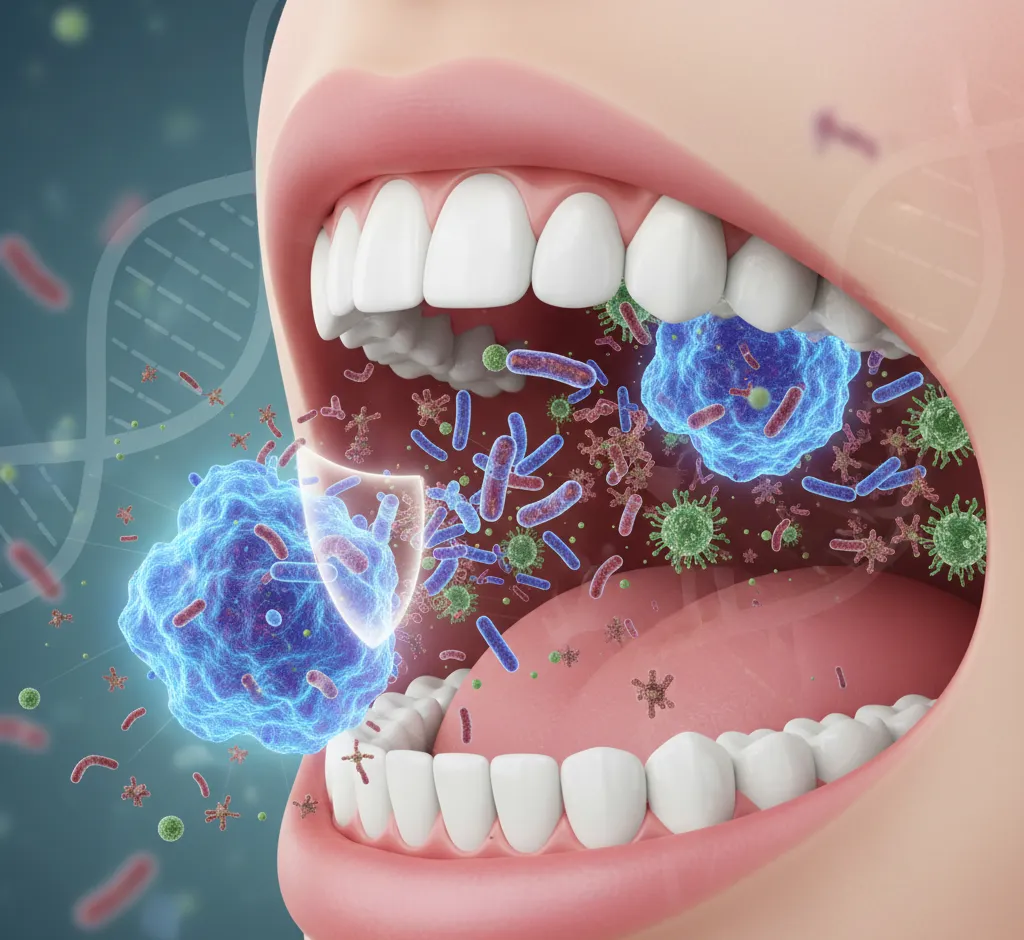Probiotics for a Superior Smile: Balancing Your Oral Microbiome for Lasting Health
Discover the revolutionary role of oral probiotics in balancing your mouth's ecosystem. Learn how specific probiotic strains combat cavities, gingivitis, and bad breath for superior, long-term oral health.

Introduction: The Unseen Ecosystem of Your Mouth
Your mouth is home to one of the body's most diverse and dynamic ecosystems—the **oral microbiome**. Far from being a sterile environment, it is teeming with billions of microorganisms, including bacteria, fungi, and viruses, which collectively form a complex biological community. For decades, traditional dental care focused primarily on eliminating 'bad' bacteria, often through harsh chemicals that indiscriminately wiped out both harmful and beneficial microbes. However, modern research has ushered in a paradigm shift, recognizing that achieving true and lasting oral health is not about sterilization, but about **balance**.
A healthy mouth relies on a harmonious balance between the beneficial (symbiotic) and harmful (pathogenic) species. When this delicate equilibrium is disrupted—a state known as **dysbiosis**—pathogenic bacteria seize the opportunity to proliferate, leading to common and chronic conditions such as dental caries (cavities), gingivitis, periodontitis, and halitosis (bad breath). This is where the emerging field of **oral probiotics** offers a revolutionary solution.
What Exactly is an Oral Probiotic?
While most people associate probiotics with gut health, the concept is the same: introducing live microorganisms that, when administered in adequate amounts, confer a health benefit on the host. An oral probiotic specifically contains bacterial strains that are naturally found in a healthy mouth, capable of colonizing the oral cavity and competitive inhibiting the growth of disease-causing pathogens. These beneficial strains work as natural guardians, helping to restore and maintain the ecological balance essential for oral wellness.
The Critical Role of the Oral Microbiome in Systemic Health
The mouth is often called the 'gateway to the body,' and the health of its microbiome has implications far beyond your teeth and gums. The oral cavity is a primary entry point for bacteria into the bloodstream and digestive tract. Chronic inflammation and infection originating in the mouth, particularly from severe periodontal disease, have been linked to a host of systemic conditions, including:
- Cardiovascular Disease: Pathogens from the mouth can enter the bloodstream, promoting inflammation and plaque buildup in arteries.
- Diabetes: A bidirectional relationship exists; poor glycemic control worsens gum disease, and gum disease can make blood sugar management more difficult.
- Respiratory Infections: Inhaling oral bacteria can lead to pneumonia, especially in vulnerable populations.
- Adverse Pregnancy Outcomes: Periodontitis has been associated with increased risk of preterm birth and low birth weight.
By using probiotics to stabilize and enrich the oral microbiome, we're not just preventing a cavity; we're implementing a foundational strategy for better overall systemic health.
How Oral Probiotics Fight Disease: Mechanisms of Action
Oral probiotics employ a sophisticated, multi-pronged attack to protect your mouth, moving beyond the temporary masking or destruction offered by conventional products.
1. Competitive Exclusion
This is arguably the most fundamental mechanism. Beneficial probiotic strains, such as certain species of Streptococcus and Lactobacillus, compete directly with pathogens for essential nutrients and adhesion sites on the surfaces of your teeth, gums, and tongue. When a healthy dose of probiotics colonizes the mouth, they essentially take up 'real estate,' physically blocking disease-causing bacteria like Streptococcus mutans (a key player in tooth decay) and Porphyromonas gingivalis (associated with periodontitis) from establishing colonies.
2. Production of Antimicrobial Compounds
Many probiotic strains naturally produce compounds called **bacteriocins** and other non-protein antimicrobial molecules, which act as highly targeted natural antibiotics. These substances can specifically kill or inhibit the growth of pathogenic bacteria without harming the rest of the host's beneficial flora, unlike broad-spectrum antimicrobial mouthwashes.
3. Immunomodulation and Reducing Inflammation
The presence of beneficial bacteria helps to regulate the host's immune response within the oral tissues. They can signal to the immune system, calming the inflammatory response that underlies gingivitis and periodontitis. This is crucial because chronic, low-grade inflammation is the primary driver of tissue destruction in gum disease. By reducing pro-inflammatory markers, probiotics help maintain the integrity of the gum-line seal and prevent the progression of periodontitis.
4. pH Balance and Acid Neutralization
One of the main culprits in dental decay is the acidic environment created by pathogens fermenting dietary sugars. Probiotics, particularly strains like Lactobacillus reuteri, can help to normalize the oral pH. They metabolize sugars in a way that produces less harmful acids, or they actively produce compounds like ammonia that help to neutralize the destructive acids produced by decay-causing bacteria, thereby creating an environment that is unfavorable for cavities.
Targeted Applications: Probiotics for Specific Oral Health Issues
Probiotics aren't just a general health booster; specific strains have shown remarkable efficacy against particular conditions:
- Combating Halitosis (Bad Breath): Halitosis is often caused by volatile sulfur compounds (VSCs) produced by anaerobic bacteria on the back of the tongue and in periodontal pockets. Probiotic strains, particularly Weissella cibaria and Streptococcus salivarius K12, can effectively outcompete these VSC-producing pathogens, leading to significant, long-term breath improvement.
- Preventing Dental Caries: Studies have shown that regular supplementation with strains like Lactobacillus rhamnosus GG and Lactobacillus paracasei can significantly reduce levels of cariogenic (cavity-causing) bacteria, especially in children and individuals with high decay rates.
- Managing Periodontal Disease: Supplementation can be a potent adjunct therapy for periodontitis. Probiotic strains help to reduce the depth of periodontal pockets and decrease bleeding on probing, two critical markers of gum health.
Choosing the Right Oral Probiotic Supplement
Not all probiotics are created equal. Efficacy relies on selecting products that contain clinically validated, live cultures designed to colonize the mouth. Key factors to consider include:
- Strain Specificity: Look for products listing specific strains such as S. salivarius K12 or M18, L. reuteri DSM 17938, or L. acidophilus NCFM, which have robust clinical data for oral health benefits.
- Delivery Method: Unlike gut probiotics, oral probiotics are most effective when delivered slowly to allow colonization. Lozenges, chewable tablets, or probiotic-infused mints are generally superior to capsules that are swallowed whole, as they maximize contact time in the mouth.
- Dosage (CFU): Ensure the product provides a sufficient dose, usually measured in Colony Forming Units (CFU), typically ranging from 1 to 10 billion CFU per dose.
In conclusion, incorporating oral probiotics represents a strategic, modern approach to dental care. By focusing on cultivating a balanced, resilient oral ecosystem, you move beyond the endless battle against 'bad' bacteria toward a state of natural health and vitality. This shift from simple cleaning to ecological management is the future of a truly superior smile.


